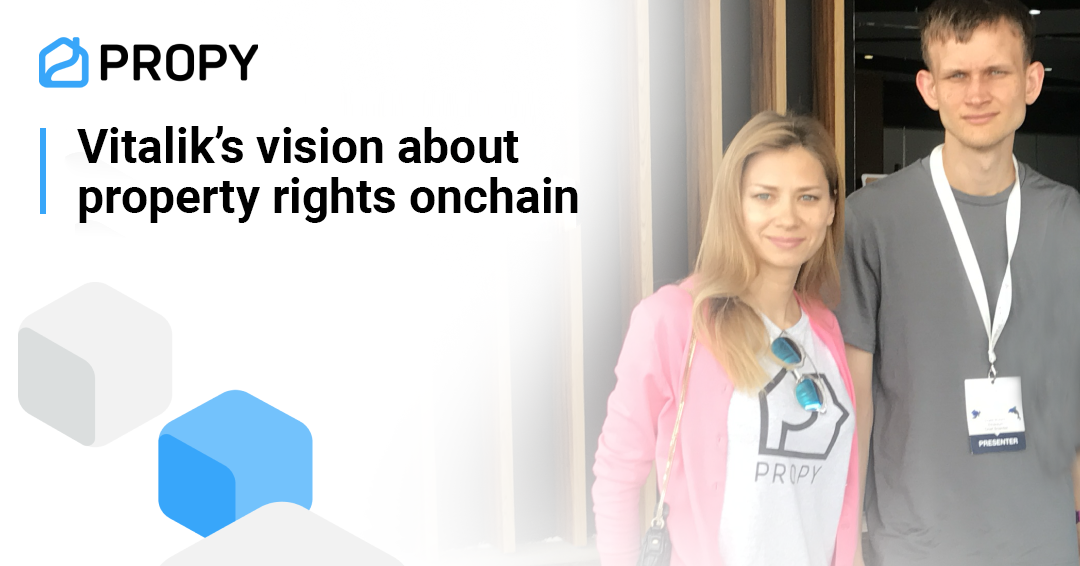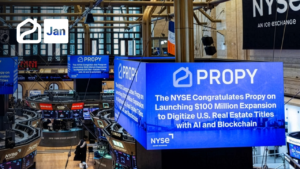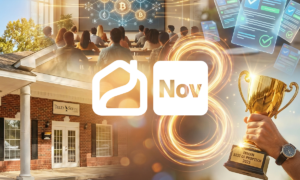Why Vitalik Buterin Believes that Property Rights and Titles Onchain Can be the Next Big Thing in Web3?
EthCC is undeniably one of the most electrifying crypto events in Europe each summer. As the global momentum for tokenization and onchain rights accelerates, the Propy team couldn’t resist joining some of the most incredible Web3 developers.
Our team happened to be staying in the same hotel where the venue for Ethereum’s mastermind, Vitalik Buterin, presentation happened, in a seemingly serendipitous turn of events. With hundreds of people in attendance, the hall was humming as they took in the newest developments and latest innovations on the largest blockchain in terms of TVL. The hall was buzzing.
Seizing the moment, our co-founder, Denitza Tyufeckchieva, took the mic and posed a compelling question to Buterin: Could blockchain-based property rights, especially in real estate and titles, be the next BIG Thing as Propy has been building such solutions on Ethereum?
In his 3-minute, insightful response, Buterin characterized the use case as both “deep” and “cool”. He elaborated extensively on the application of blockchain for real estate. Let’s dive into some of the key highlights from his speech.

1. The Power of Digitization
Vitalik Buterin emphasizes that digitalization is pivotal in revolutionizing global property rights. In his words,
“there are a lot of benefits that come from just plain digitization. In probably still most of the world land ownership rights are not even digitized.”
The lack of digitalization is a significant issue affecting land ownership worldwide, with many regions plagued by either non-existent or poorly maintained land ownership records. Blockchain technology, however, offers a promising solution.
By digitizing land ownership rights, we can establish a secure, immutable record that provides indisputable proof of ownership. This decentralized ledger ensures that records are tamper-proof and universally accessible. Additionally, this approach can unlock the value of high-value assets, enabling owners to access credit and invest in further economic activities.
Digitized records streamline transactions, making them faster, more transparent, and cost-effective. A blockchain based system guarantees that every transaction is recorded transparently and is accessible to all relevant parties, thereby reducing the potential for corruption and errors.
2. The Potential of Blockchainization
Vitalik Buterin underscored the concept of “blockchainization” of real estate. He highlighted that /
“if you go from digitizing to blockchainizing, then you actually get a much more direct ability to get approved on things about your current ownership”.
One of the key advantages blockchain brings is the creation of immutable records, ensuring high security and trust, as records, once created, cannot be altered or tampered with.
Furthermore, blockchain provides transparent ownership and transaction histories, making it easy to trace a property’s past
“to compose and iterate and make everything programmable and experiment with a lot of different designs”,
Buterin adds. Smart contracts further enhance this process by automating escrow and settlement, for ownership transfers, and designs for future economic models for the Network States concept (introduced by Balaji). The cutting-edge technologies of web3 make buying, selling, and managing properties more reliable, accessible and composable.
3. Innovative Ownership Models
Beyond technological advancements, Vitalik Buterin suggests that onchain real estate offers the opportunity to explore novel and creative ownership schemes. Traditional real estate ownership often comes with numerous challenges that can be mitigated.
Blockchain based real estate models propose innovative solutions to key challenges in property ownership. For instance, implementing land value taxes can create a more equitable balance between the costs and benefits of owning real estate. Moreover, decentralized governance empowers property owners to participate in decision-making regarding common areas and community issues, fostering a more democratic and engaged environment.
Since real estate ownership is a social concept rather than the walls themselves, this asset is a perfect one to be the next one to be blockchainized after money. Ownership could be moved peer-to-peer with a proven model by Propy and hence, is programmable and DeFi-composable.
Conclusion
The integration of real estate and property rights onto the blockchain is transforming how we manage and engage with real estate with a potential to turn this asset into a seizure-resistant and programmable onchain asset. By embracing digitization and blockchain technology, and exploring innovative ownership models, we can address many of the inefficiencies and challenges inherent in the current economy.
This transformation holds the potential to generate substantial wealth, especially in the developing world, enhance transparency, and foster a more diverse and equitable real estate market in most advanced economies. With the younger generation increasingly entering this high-value sector, the future of this most valuable asset class appears promising.
Join our community channels
X (Twitter) | Discord | Instagram | Telegram | Facebook | LinkedIn






